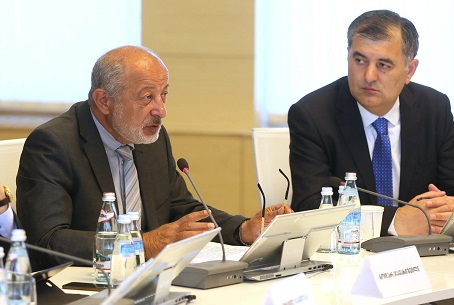PM tasks cabinet to react quickly to natural disasters

The recent natural disasters in west and northeast Georgia and the effects on the local population were the focus of today’s Governmental meeting in capital Tbilisi.
This morning Prime Minister Giorgi Kvirikashvili spoke about the damaging effects of the recent landslides and heavy rain and flooding, and tasked his cabinet ministers to react quickly to these and future incidences to reduce the initial effects and quickly overcome the disasters.
Georgia’s Minister of Regional Development and Infrastructure Nodar Javakhishvili briefed Kvirikashvili about yesterday’s heavy downpour and flood in the mountainous Adjara region in the west.
Javakhishvili said the disaster damaged homes and infrastructure in two municipalities - Keda and Shuakhevi – where seven bridges were totally destroyed, two others required rehabilitation, road infrastructure was destructed and four villages were cut off from the rest of the country.
Javakhishvili also said the Government used a special, bypass road to reach the four villages however this route could only be accessed by vehicles with 4-wheel drive. He stressed relevant state agencies have already begun restoration and rehabilitation activities to fix the damaged infrastructure.
Kvirikashvili said it was good there were no human victims of the recent disasters but noted people in the affected communities now needed assistance.
It’s good we have no human casualties but we must provide timely aid to the people in the affected villages. I task the Ministry of Finance to allocate finances so work can be done to quickly fix the damage,” said the PM.
Meanwhile Javakhishvili also spoke about last week’s landslide in Georgia’s northeast Devdoraki Gorge, which washed away a main road and caused works to be suspended at the Georgia-Russia border checkpoint.
The Minister said if the weather was good, rehabilitation and clearing works would continue and the road in Devdoraki Gorge would open in two weeks.
Currently Georgia was using a ferry as an alternative way to transport fruit to Armenia, said Kvirikashvili, and he noted exporters were also using this method to transport their goods elsewhere.
Despite this alternative, Kvirikashvili stressed Georgia needed to be better prepared for future natural disasters so the effects were not as damaging to infrastructure, and to arrange an alternative solution that could be quickly utilised in such incidences where roads were closed or transit routes were blocked.
 Tweet
Tweet  Share
Share